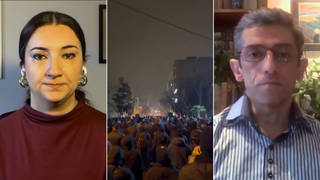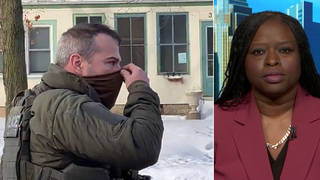
A new report titled “You Feel Like Your Life Is Over” details the dangerous and abusive conditions faced by immigrants held at three ICE jails in Miami, Florida, since Trump returned to office. One testimony describes how detention officers made men eat while shackled with their hands behind their backs. One man said, “We had to bend over and eat off the chairs with our mouths, like dogs.” The report describes how detained immigrants are also routinely denied access to legal counsel and critical medical attention, while some have been held incommunicado in solitary confinement as an apparent punishment for seeking mental healthcare. Democracy Now! spoke with Belkis Wille, associate director in Human Rights Watch’s Crisis, Conflict and Arms Division. The immigration “system is abusive and is treating immigrants in detention in a dehumanizing manner,” she says.
Transcript
AMY GOODMAN: This is Democracy Now!, democracynow.org, The War and Peace Report. I’m Amy Goodman.
“You Feel Like Your Life Is Over.” That’s the title of a new report released jointly by Americans for Immigrant Justice, the Sanctuary of the South and Human Rights Watch. It details dangerous and abusive conditions at three immigration detention centers in Miami, Florida, since Trump returned to office.
One of the detained people they spoke to said detention officers made men eat while shackled with their hands behind their backs. One man said, quote, “We had to bend over and eat off the chairs with our mouths, like dogs.” The report also describes how detained immigrants are routinely denied access to legal counsel and critical medical care. Some have been held incommunicado in solitary confinement as an apparent punishment for seeking mental healthcare.
For more, we’re joined by Belkis Wille, an associate director in Human Rights Watch’s Crisis, Conflict and Arms Division, author of the new report, “'You Feel Like Your Life Is Over': Abusive Practices at Three Florida Immigration Detention Centers.”
Belkis Wille, thanks so much for joining us from Washington. We have spoken to you about abusive conditions in countries around the world. We’re talking to you right now about what’s happening here in the United States, in Florida. Talk about what you found.
BELKIS WILLE: What we found was that since January 20th of this year, there has been an upsurge in immigrants being detained, including, in particular, in Florida. And what this meant was that tons of people were being brought to these immigration detention centers. One of the ones we look at, Krome, within the first three months of the year was suddenly at, you know, two, three times its capacity in terms of the number of people being brought. And with that overcrowding came truly horrific conditions, unsanitary conditions, people being unable to get access to medical care, both to see medical health professionals and to get key treatment that they need for chronic health conditions, women being brought to a male-only detention center, being held there and denied any access to medical care because they were told this is a male-only facility.
AMY GOODMAN: In a TikTok video that went viral in March, an unidentified immigrant from Mexico detained at the Krome ICE jail in Miami begs for help. As he secretly records the inhumane conditions inside his overcrowded holding cell, several other immigrant men are seen sleeping on the floor. And the significance of it, what it is showing?
BELKIS WILLE: So, what we see in that video is exactly what was described by these men that were held at Krome Detention Center. These cells are being used for the, quote-unquote, “processing period” when people are first brought in. Now, these cells are only meant to hold a small number of people for a matter of hours. Those conditions you saw, those are men who were held in there for one week, two weeks in those rooms. They do not have regular access to showers. They’re in frigid temperatures with the air conditioning blasting. They’re sleeping on concrete floors for days. Some of the rooms don’t have, you know, regular access to a sink and soap to wash people’s hands.
And as I mentioned, those same cells were being used at some point to hold women being brought to Krome — again, a male-only facility. The women told me that in their cell they had a toilet, but with the way that the windows were only partially glazed over, male detainees from other cells could actually stand on a chair and look in and watch them while they were using the toilet.
AMY GOODMAN: So, if you can talk about the people who have died in detention in Florida?
BELKIS WILLE: What we saw across all three detention centers that we looked at was really a concerning and chronic lack of access to appropriate medical care. And what we saw was that people with, you know, chronic health conditions, where their records were on file — it was clear that they had diabetes, or they had HIV or asthma or any number of conditions — they were not being given regular access to their medication. And in some cases, people begging to see a doctor were not given access to a doctor.
And in the case of two instances, a Ukrainian man, Maksym, who was brought in, you know, he was in very good health, his wife said, until he got brought to Krome. He got sicker and sicker, was begging to see a doctor. He saw medical professionals that were not prescribing him medication to address his illnesses. And we spoke to his cellmate, who describes how in the middle of the night, suddenly he started foaming at the mouth, vomiting, defecated on himself. That day, again, he had been insisting to see a doctor and had not seen one. And he was taken away on a stretcher and then died. And there was also a Haitian woman the same age as Maksym, also 44, and we interviewed a woman who was in the cell opposite her, who saw her collapsing and had —
AMY GOODMAN: This is Marie Ange Blaise?
BELKIS WILLE: Exactly. This is Marie Ange Blaise. And the woman we spoke to watched as it took far too long for a guard to come, as cellmates were screaming for a guard. The guard came, sauntered over, then walked away slowly before calling the medical team. They took, you know, 10, 15 minutes to arrive. And then one signaled to the rest of the group, you know, “It’s too late,” and the woman was taken away and then pronounced dead.
AMY GOODMAN: So, she was held at Broward Transitional Center, BTC. You also report on Federal Detention Center and, of course, Krome in Miami. Can you talk about what it means when these companies, when these — I didn’t actually say that wrong — when these jails are privatized? They’re companies. And what role do they play in, for example, when they don’t have enough food for people? You save money by not giving them so much food.
BELKIS WILLE: Absolutely. So, Broward Transitional Center, BTC, and Krome are both run by private companies that have contracts from ICE to run them. And at a facility like Krome, as I said, you know, within the first three months of the year, they became, you know, far over capacity of the facility.
And detainees explained to me, those that were already detained in 2024, the change in conditions. Suddenly they weren’t getting, you know, substantial and warm breakfasts anymore. Suddenly their meal portions for lunch and dinner were cut. They couldn’t even eat in the canteen anymore. They were required to eat in their cells, which is still the case, because the facility is so overcrowded. And as you said, that’s a financial matter, that, you know, that’s a way of saving on the money being spent on food.
When we wrote to the companies that are running Krome and BTC, we got no responses to our substantial allegations. One company simply wrote back and said, “You have to talk to ICE. We can’t respond to any of your allegations.”
AMY GOODMAN: What exactly is Human Rights Watch calling for now? I mean, these three detention centers in Florida are a small example of the mass, expanding detention complex that is growing across this country, from places in swamps like the Everglades, what the Republicans have called “Alligator Alcatraz” to make it sound a bit cute, to the new, expanding detention centers on military bases.
BELKIS WILLE: Absolutely. I mean, as you said, this is just a small example of a system that is abusive and is treating immigrants in detention in a dehumanizing manner.
One immediate thing that could be done by the government that would really limit the number of people who are at risk of ending up in these facilities is to reinstate programs like the humanitarian parole and TPS programs, programs that invited people from Cuba, from Haiti, Venezuela, Nicaragua, Afghanistan, to come to this country lawfully. And these people were told they could come to America and got this protection until the situation in the country of their origin improved. And instead, suddenly saw a political decision taken to strip these people of their status, and now all of these people, as their status gets terminated, are at risk of being detained at these detention centers. So, that’s one very easy and quick fix.
But, you know, there are also so many alternatives to detention for immigrants. It was ICE itself, in 2004, that developed an alternatives to detention program, a program that, by many measures, was effective. Why do we — why are we seeing a system that is using detention centers as the default, when we’re showing very clearly these detention centers are carrying out abuses, and not just abuses of international human rights law, but abuses of ICE’s very own detention standards?
AMY GOODMAN: What does it mean — and maybe you can’t answer this, but — when an ICE jail is placed on a military base? Already, congressmembers, who have every right to go at any time, unannounced, to an ICE jail to investigate, to inspect, are having trouble getting in, under the Trump administration. But if they then have to get not only permission from ICE, but from the Pentagon, to get onto a military base?
BELKIS WILLE: That’s of extreme concern. So much of the immediate solution that’s needed to address and rein in these abuses is oversight. And oversight includes an ability for those in power to visit these facilities and to ensure that abuses are not being carried out. What we heard from people at facilities like Krome is that when the management of the facilities and ICE found out there was going to be a visit, you know, a few nights before, suddenly, a hundred men would get transferred out, a wall would get repainted, so that, you know, the reality of the facility and its overcrowding would not be properly seen. So, when you’re talking about facilities that are even harder to get access to, it really means we’re talking about a black hole that does not allow for appropriate oversight of conditions.
AMY GOODMAN: Belkis Wille, we want to thank you for being with us, associate director in Human Rights Watch’s Crisis, Conflict and Arms Division. We’ll link to your new report, “You Feel Like Your Life Is Over.”












Media Options